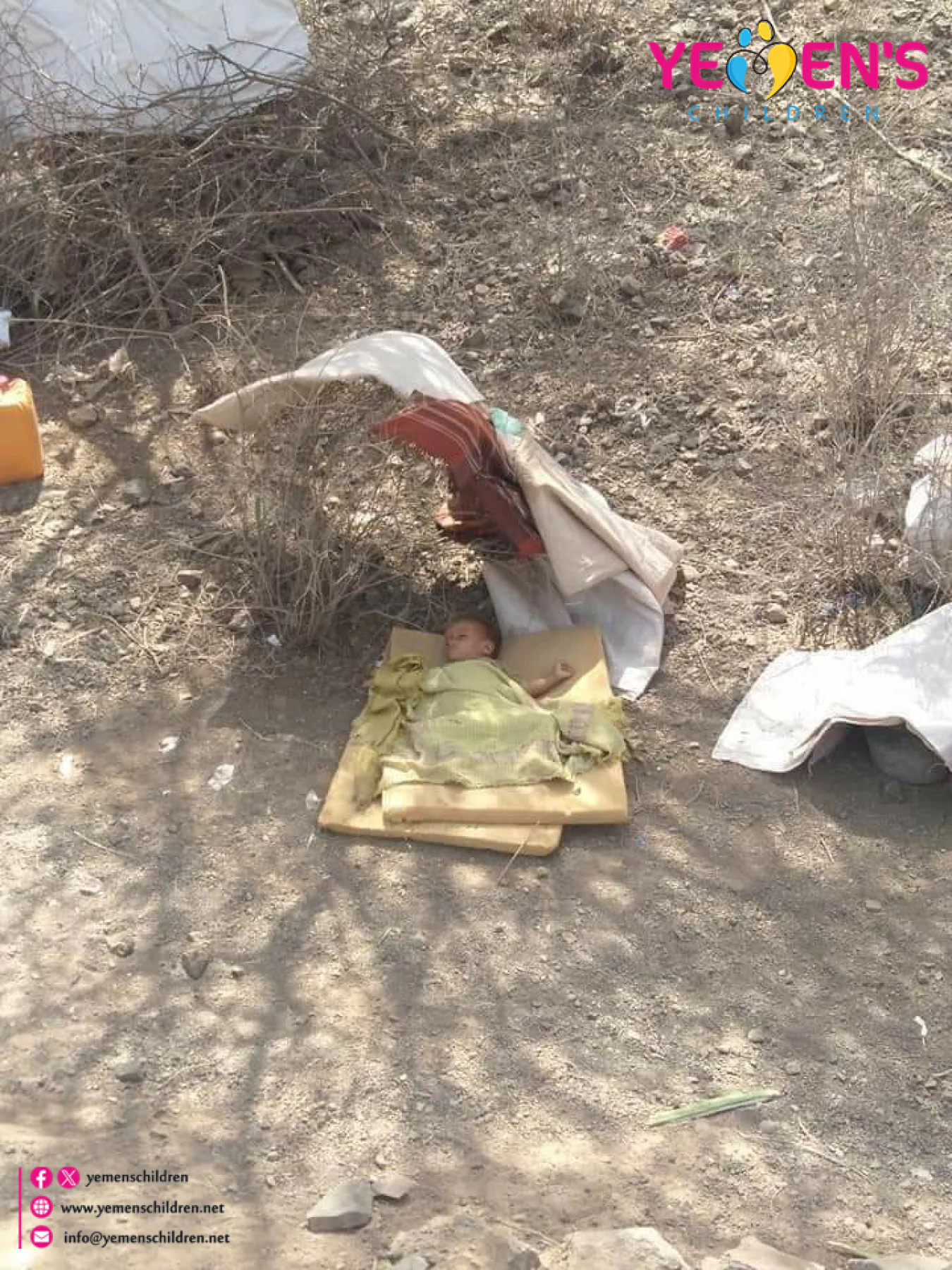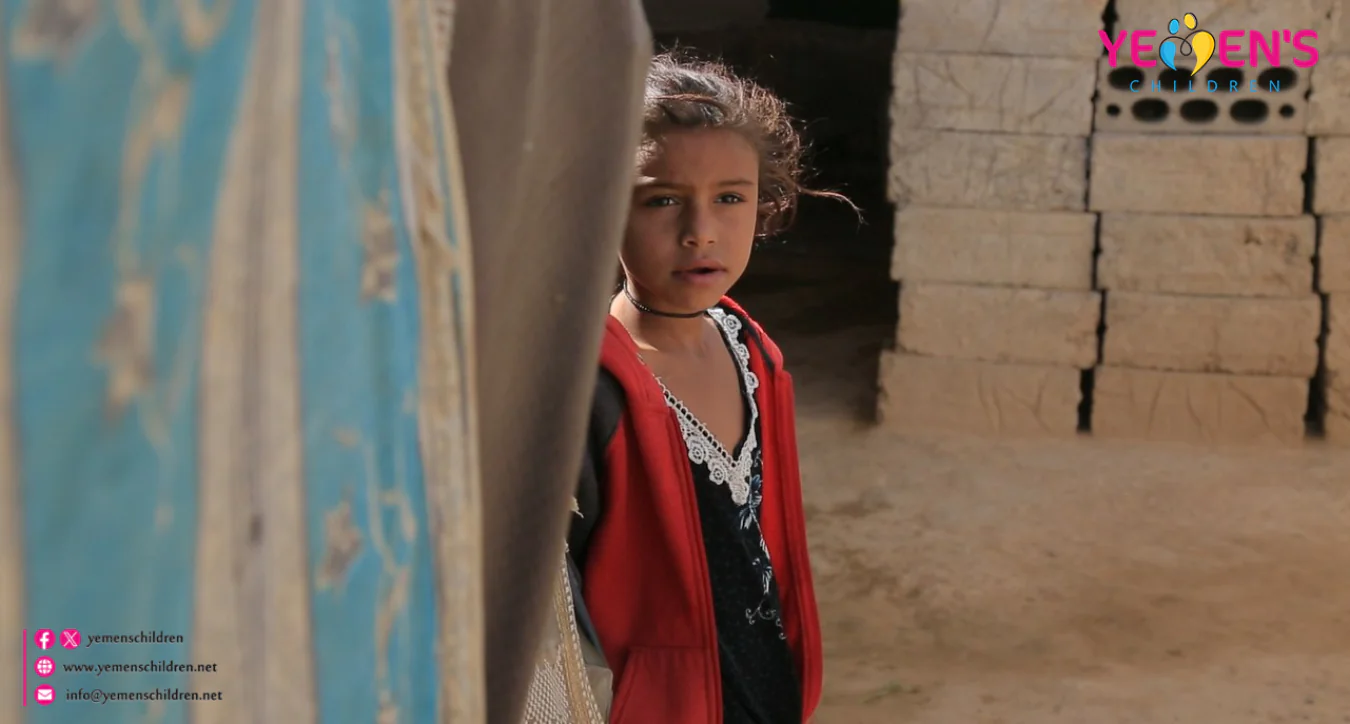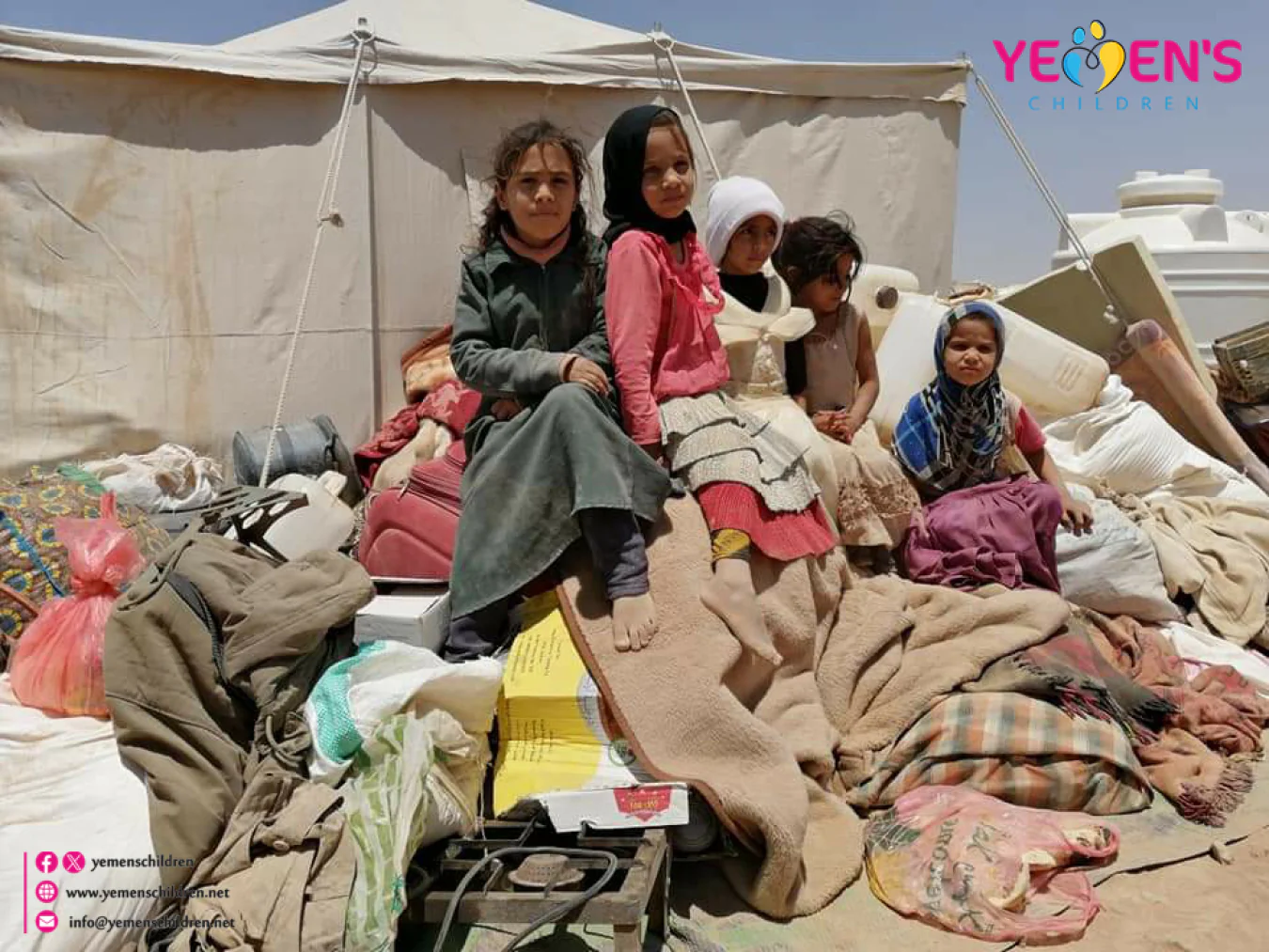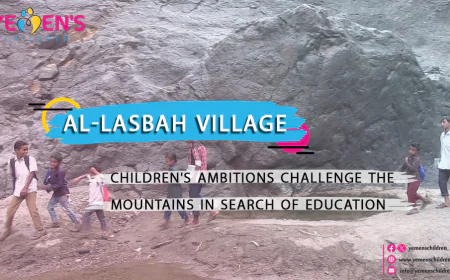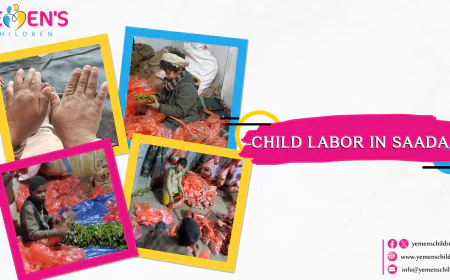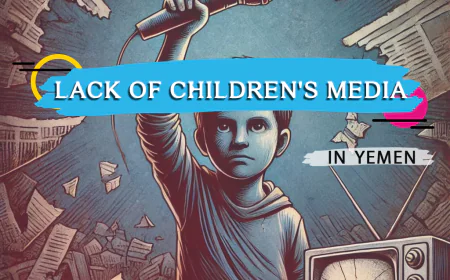Camp children..a blanket without heating
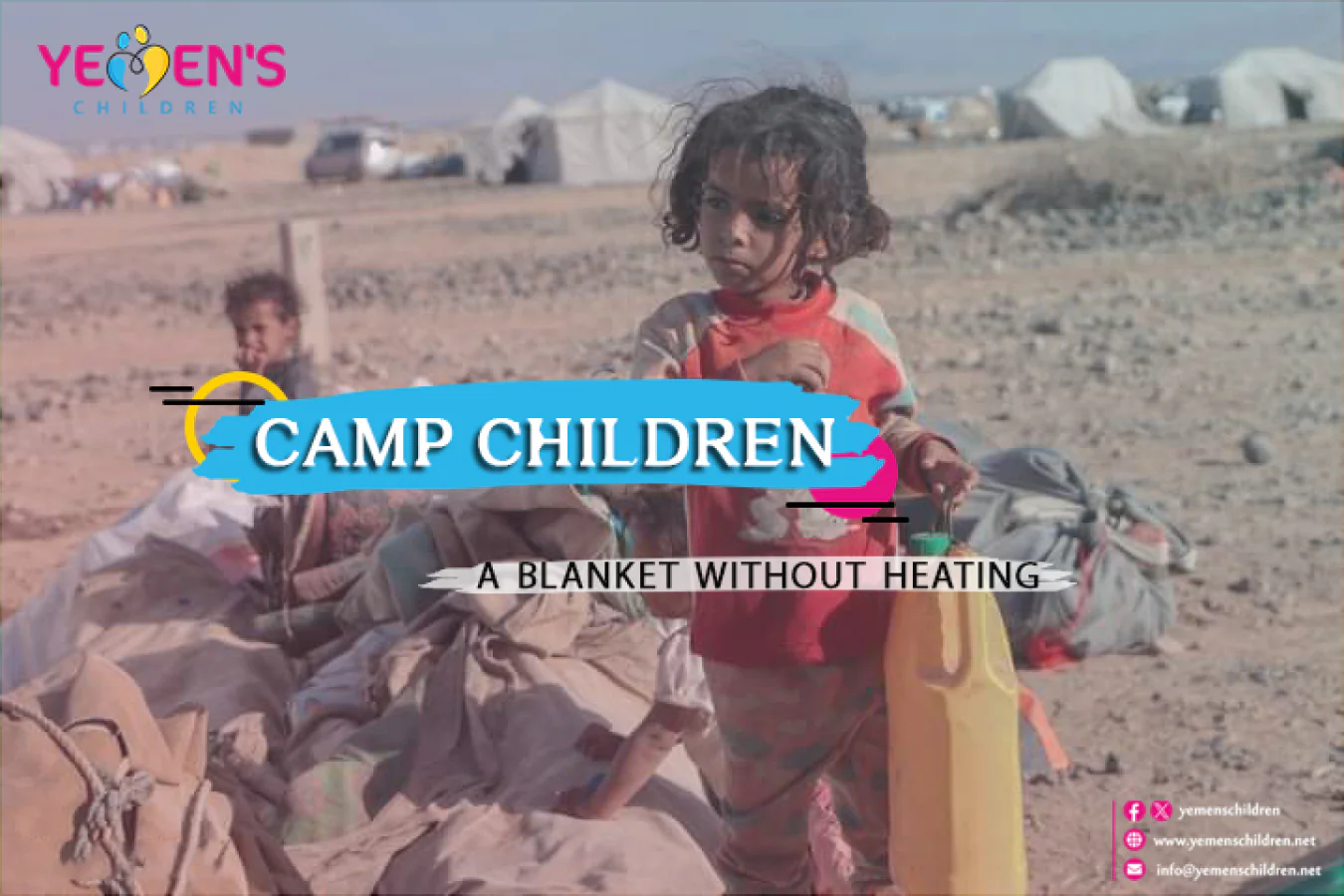
Yemen Children's Platform - Adi Al-Dakhini
Scarce resources in a very poor situation and the cold of winter is tearing apart the lives of children in the camps for the displaced in the city of Taiz and Marib, in light of the ongoing war and siege by the Houthi Ansar Allah group for the tenth year in a row.
The child Amjad Adel, 12 years old, who is displaced in the Al-Bireen camp in Taiz governorate, goes out to the markets of Al-Bireen looking for water bottles to sell in exchange for providing the basic needs for his family of four and buying some winter supplies for his family.
The Mother of Amjad told the "Yemeni Children's Platform" that she has no breadwinner other than her young son who is no more than 12 years old and three daughters. "Amjad goes to the Bireen market every day to look for plastic water bottles and collect them, then sells them and returns to us with two or three thousand riyals to buy a little flour.
She added that the economic conditions and the war that displaced them from their homes meant that her only son does not go to school to receive his education like the rest of the students. All the students go to school, and her son goes to collect empty bottles and sell them to provide winter clothes for him and his sisters. He explained that the cold of winter this year is different from every year. There are no means of heating and no support from organizations to provide winter supplies for them, and that they face great challenges in providing winter supplies such as blankets and clothes.
For her part, The mother of Haroun, a displaced person from the Maqbanah District of the Al-Tuwair area to the Al-Rahba camp in the Jabal Habashi District, west of Taiz Governorate, tells her story to the "Yemeni Children's Platform", saying: For four years, we have been displaced from our homes among dilapidated tents that do not protect our children from the cold and frost, with no comfortable shelter and no source of income that can provide the basic and necessary requirements to buy winter clothes for our children.
She adds that the war displaced us from our homes and we are now in these tents as you see them in front of you, and our children suffer from infections, fevers and colds in addition to cholera, especially with the severity of the cold, infectious diseases are transmitted to us through mosquitoes and sewage services that have become exposed, through which diseases are transmitted.
The bitterness of displacement
The situation is changing and the suffering of the displaced people in Marib city is increasing day after day, as this year's winter season comes with more suffering in light of the lack of reduction in support from humanitarian organizations, the deterioration of the economic situation in the country, and the rise in the prices of winter clothes. They found themselves unable to buy the necessary requirements to provide blankets and blankets, and they are burdened with worries and helplessness, as a result of years of displacement and staying here, in light of difficult living and economic conditions that have robbed them of the ability to buy the needs of this cold.
Hajj Ghanem Al-Marzah, a displaced person in Al-Jafina camp in Marib Governorate, told the "Yemeni Children's Platform", "We were unable to provide the necessary food to satisfy the hunger of my seven children, and as for winter clothes for our children, this is something that is difficult for us to provide for them, as this is the second year that we have been wearing light quilts that the cold easily penetrates, and we are satisfied with them.
For his part, Ayed, a displaced person in the same camp, asks bitterly: "Where can I get the income to buy winter clothes for my children when the situation is as you see? There are no humanitarian organizations that support us in providing these clothes, no social initiatives, no jobs, and no source of income."
He pointed out that his situation was better in the past years before the war, but this year was different for him, especially since there is a severe wave of frost.
The burden of poverty and deprivation
The burden of suffering increases more for displaced families in displacement camps in various Yemeni governorates with the advent of the winter season, as millions of families live in dilapidated camps that lack the minimum requirements for a decent life and suffer under the burden of poverty and deprivation, as many displaced people have lost their sources of income and their ability to provide a livelihood, let alone provide what brings joy to their souls to live a decent life during the winter.
According to a United Nations report published at the beginning of this year, more than half of Yemen's population is in need of humanitarian and protection services by 2024.
She explained that more than 18 million Yemenis are in need of this humanitarian assistance, and about 12.4 million Yemenis lack access to safe drinking water, and 17.6 million Yemenis are facing severe food insecurity.
She explained that there are 4.5 million internally displaced Yemenis, and the relief response requires $2.7 billion to support 11 million people across the country.
She added that the suffering of Yemeni children who are going through the tenth year of the ongoing civil war, including 1.3 million displaced children facing a lack of resources, more than 4.5 million children out of school and missing out on educational opportunities, and more than 600,000 children with disabilities who lack appropriate support for their needs.
Harsh conditions
In this context, Hoda Al-Sarari, head of the Defense Foundation for Rights and Freedoms, told the "Yemeni Children's Platform" that the situation of children in displacement camps in general, including the governorates of Marib and Taiz, represents a humanitarian tragedy due to the harsh conditions they live in, especially in the winter.
The repeated displacement and lack of basic needs have made children the most affected group, as they suffer from a lack of food, health care, and adequate shelter, in addition to the absence of stable educational opportunities.
She added that as for the main needs of children in the winter, children are in dire need of heavy winter clothes, including coats, shoes, socks, and thermal blankets necessary to provide warmth at night.
Noting that the camps often lack thermal insulation and tents suitable for withstanding rain and cold winds, and providing high-quality tents or support to improve temporary shelter is vital, and that malnutrition worsens in the winter due to the body's increased need for energy and heating. Meals rich in calories and vitamins must be provided.
Because seasonal diseases such as respiratory infections and influenza spread rapidly due to cold weather, there is an urgent need to provide essential medicines, mobile medical services, and vaccines.
She points out that children need safe spaces and activities to help them overcome the psychological trauma they are experiencing, as continuing education can give them a sense of security and stability, and that the weak response from international and local organizations and the lack of resources available to families to provide basic needs exacerbate the situation due to ongoing conflicts and insecurity.
She believes that the local and regional community must play an important role by organizing donation campaigns to provide winter clothes and focusing on individual and institutional efforts to collect and distribute aid, such as blankets and warm clothes, and that if basic needs are provided, the suffering of children in camps can be alleviated and they can be protected from the harsh effects of winter.
